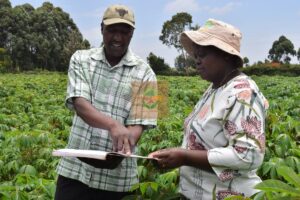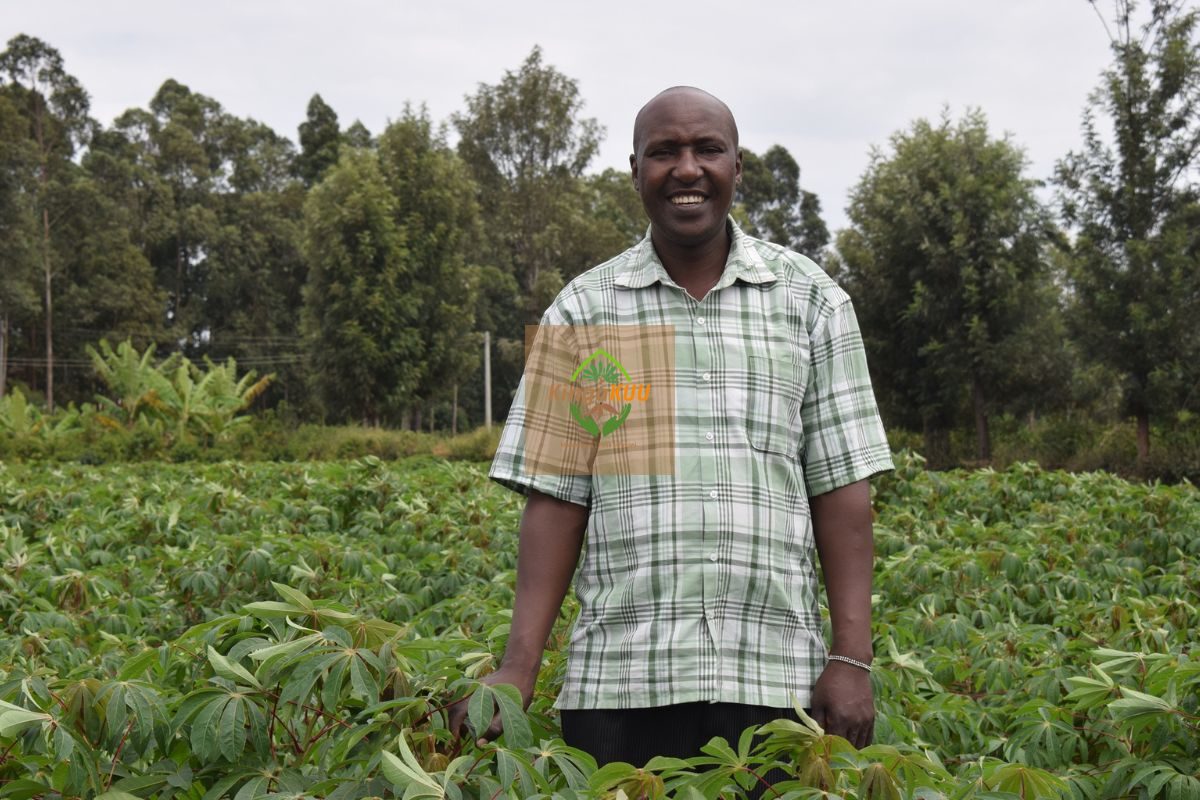Joseph Mwita Matiko (captured in his cassava seed farm-photo above) is a farmer based in Kuria East, Migori County in Kenya, Joseph owns a 1-acre piece of land which he has been practicing his mixed crop farming with his family and household for close to the last 2 decades.
Joseph, a passionate maize and vegetable farmer, first ventured into cassava farming in 2015 through initiatives by the National Government’s Ministry of Agriculture to curb food insecurity, the distribution of cassava seeds from the government initiatives had challenges and seed provided was usually only enough for subsistence farming, this limited Josephs passion to practice commercial cassava farming. Joseph recalls how the seed given through the initiative was of low quality resulting to poor germination, took very long to mature, was prone to pest and diseases and was commonly attacked by the “dieback” disease, as a result, farmers discontinued cassava farming in the region. Cassava farming in his community was very fragmented and run conventionally, He and other local farmers would continue to recycle cassava seed cuttings or obtain unclean seed cuttings from their neighbors or friends. Other seed sources were from Tanzania which neighbors Migori County to the south, seeds cuttings from the neighboring Country would freely and conventionally move among communities without any quality inspection or certification.
“The Cassava variety we used to plant was commonly known as “Muhogo Mahindi”, the variety would have severe pest and disease infestation and usually attacked by the dieback disease, the germination rate was usually very low- below 30 percent, and we would harvest very low yields. Farmers in the region got discouraged and the majority discontinued farming.

Joseph Joined VIRCA project in November 2021, this as he says was the first time ever he interacted with a Casava seed project. Joseph took up the opportunity and began attending training sessions and workshops organized by the VIRCA project and its partner Kenya Agricultural and Livestock Research Organization-KALRO and other collaborators like Kenya Plant Health Inspectorate Services-KEPHIS where he received training on, or entrepreneurship skills, Land preparation, seed identification, disease and pest identification and management, plant spacing and financial managements. The project also linked Joseph to KALRO for access to clean and improved seed for seed farm establishment and KEPHIS for certification and quality assurance inspections, Joseph also managed to understand the Cassava Seed Entrepreneur (CSE) model.
Despite owning a small piece of land, Joseph decided to lease land from his neighbor in the village and established a four-acre cassava seed farm planting 32,000 cuttings of disease-tolerant MM96/0686 cassava variety of the MM series. Being the first time he was venturing into large-scale Cassava farming for seed production, Joseph has observed a germination rate of over 90% in his farm, which he says was not the case in previous cassava varieties he ever planted. He anticipates harvesting and selling the clean and improved cassava seed cuttings in end of the year 2023.
“During the training, I would have a lot of aha! moments, for example, I previously believed that I had to do earthing up of my cassava plants “commonly known as Matuta” as we do for other tubers like potato and sweet potatoes to get good yields, but I have learned it is not the case with Cassava”
Despite challenges on access to improved and disease-resistant cassava seeds, erratic weather conditions, and high farm labor costs in the project regions, Joseph’s hope is that he and other CSEs in his County will produce enough improved and disease-resistant cassava seed and have it available to farmers, this will increase cassava yield, household incomes and ultimately make the communities food secure. He also anticipates using proceeds from the Cassava seed business to educate his children to better their future while surplus income will be used for home renovation and household upkeep of his eight dependants.
“cassava has commonly been referred to as the poor man’s crop in this community, farmers within the region who have visited my four-acre cassava seed farm are in shock to see the cassava crop very healthy and disease free, the ‘poor man’s crop’ narrative is changing”


